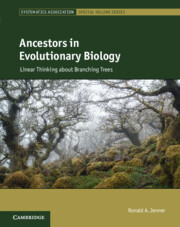Book contents
- Ancestors in Evolutionary Biology
- The Systematics Association Special Volume Series
- Ancestors in Evolutionary Biology
- Copyright page
- Dedication
- Contents
- Acknowledgments
- 1 A History of Narrative Phylogenetics
- 2 From Archetypes to Ancestors
- 3 The Emergence of Lineage Thinking
- 4 Ernst Haeckel’s Evolutionary Storytelling
- 5 The Epistemic Rise of Hypothetical Ancestors
- 6 Intuiting Evolution
- 7 Telling Straight Stories with Fossils
- 8 Seeing Animal Ancestors in Embryos
- 9 Ancestral Attractions and Phylogenetic Folklore
- 10 Narrative Shortcuts and Phylogenetic Faux Pas
- 11 Taxic Distortions of Lineage Thinking
- 12 Making Sense with Stories
- References
- Index
- Systematics Association Special Volumes
6 - Intuiting Evolution
Published online by Cambridge University Press: 08 July 2022
- Ancestors in Evolutionary Biology
- The Systematics Association Special Volume Series
- Ancestors in Evolutionary Biology
- Copyright page
- Dedication
- Contents
- Acknowledgments
- 1 A History of Narrative Phylogenetics
- 2 From Archetypes to Ancestors
- 3 The Emergence of Lineage Thinking
- 4 Ernst Haeckel’s Evolutionary Storytelling
- 5 The Epistemic Rise of Hypothetical Ancestors
- 6 Intuiting Evolution
- 7 Telling Straight Stories with Fossils
- 8 Seeing Animal Ancestors in Embryos
- 9 Ancestral Attractions and Phylogenetic Folklore
- 10 Narrative Shortcuts and Phylogenetic Faux Pas
- 11 Taxic Distortions of Lineage Thinking
- 12 Making Sense with Stories
- References
- Index
- Systematics Association Special Volumes
Summary
In this chapter I survey how biologists and paleontologists have used their imagination and evolutionary intuitions to animate phylogenetic narratives. Many authors intuited the direction of character evolution from clues provided by the threefold parallelism. The form changes that can be observed during ontogeny, and those inferred from the stratigraphic sequence of fossils, have inbuilt time axes that can be used as shortcuts for proposing lineages of changing forms. But interpreting the polarity of character change suggested by the systematic leg of the threefold parallelism was less straightforward. Many researchers intuited or imposed the direction of evolutionary change by proposing smoothly transitional linear series of observed or imagined forms. Some evolutionary intuitions date back to pre-evolutionary times, while others emerged from the search for evolutionary laws, such as Cope’s rule of phyletic size increase. When the first molecular phylogenies were published, researchers often muted their once vocal evolutionary intuitions to accept sometimes deeply puzzling results. The complete suppression of the evolutionary imagination is associated with the flawed but widespread strategy of using observed differences between taxa as prima facie evidence against monophyly and homology. It frequently diverts phylogenetic debates into fruitless avenues.
Keywords
Information
- Type
- Chapter
- Information
- Ancestors in Evolutionary BiologyLinear Thinking about Branching Trees, pp. 150 - 180Publisher: Cambridge University PressPrint publication year: 2022
